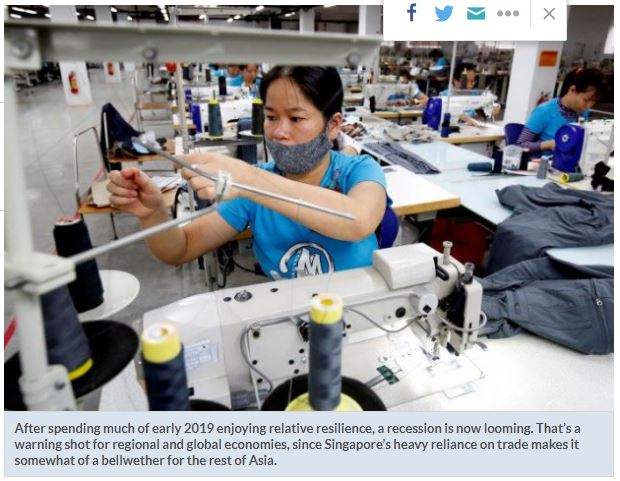Trade war spurs recession risk in Singapore
SINGAPORE: The US-China trade war is threatening to drag export-reliant Singapore into a recession and aggravating underlying risks facing the former tiger economy.
Singapore’s economic data have gone from bad to worse this month. Exports slumped to their second-worst rate since the global financial crisis, the purchasing managers index slipped into contraction for the first time since 2016, and the economy shrank the most in almost seven years in the second quarter.
After spending much of early 2019 enjoying relative resilience, a recession is now looming. That’s a warning shot for regional and global economies, since Singapore’s heavy reliance on trade makes it somewhat of a bellwether for the rest of Asia.
The severity of the slump may be down to trade tensions and a global slowdown, but Singapore has been grappling with longstanding economic threats that have been slowly eroding the city state’s growth potential: rapid ageing, labour market shrinkage, and sluggish productivity among them. Those risks will become more acute for policy makers now.
“Any undue turbulence or prolonged stresses from the trade war are only going to compound the challenges of all the other issues — productivity, demographics, anything else,” said Vishnu Varathan, head of economics & strategy at Mizuho Bank Ltd in Singapore. “External demand concerns will be at the top of the list for now, because if you don’t get that one right it’s that much more difficult to solve everything else.”
Singapore remains one of the most export-reliant economies in the world, with trade equivalent to 326% of gross domestic product, according to World Bank data. That puts the city state at the centre of the storm stirred up by its top two trading partners sparring over tariffs.
The shock GDP figures earlier this month prompted some analysts to downgrade their Singapore forecasts for the year to below 1%. The government is set to revisit its own 1.5%-2.5% range next month, but for now, it’s remaining calm, seeing no recession for the full year.
The slump is largely contained so far to manufacturing, which makes up about a fifth of the economy, but could soon spread to other sectors such as retail and financial services.
That increases the risk of job losses at a time when businesses like International Business Machines Corp are already laying off workers and banks such as Nomura Holdings Inc cut staff.
The number of retrenched workers in Singapore rose to the highest in more than a year in the first quarter, though the unemployment rate has remained fairly steady at 2.2% amid a recovery in construction.
“The labour market looks to be on two tracks at the moment — there’s a weak market in the manufacturing sector but a steady one in the services sector,” said Shaun Roache, chief Asia-Pacific economist at S&P Global Ratings in Singapore. “High-frequency indicators including industrial production and trade suggest that the environment will remain challenging in manufacturing for the year.”
While those cyclical headwinds buffer the outlook, policy makers are also grappling with structural impediments to growth.
Faced with a rapidly aging population, the government has been on an aggressive campaign to re-skill its labour force and prepare workers for a postponed retirement.
The median age is set to rise to 46.8 years in 2030 from 39.7 in 2015, faster than the other top economies in South-East Asia as well as the world as a whole, according to United Nations projections. — Bloomberg
Source: https://www.thestar.com.my/business/business-news/2019/07/26/trade-war-spurs-recession-riskin-singapore/#UoCMAfGAK8SWcp8M.99


 English
English




